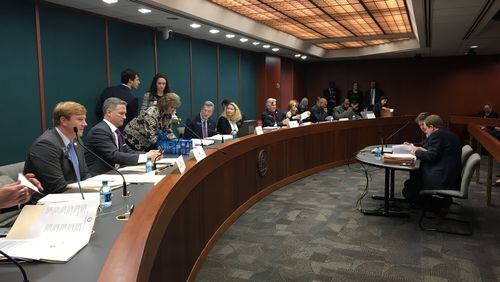A bill to make adoptions in Georgia faster and easier passed a state Senate committee Wednesday, without controversial "religious liberty" provisions that stalled the legislation last year.
But senators changed the adoption legislation, House Bill 159, in other ways that could hurt its chances of becoming law.
The amended version of the bill includes a proposal Gov. Nathan Deal vetoed last year, limits expense payments to birth mothers and partially reinstates waiting periods before adoptions can be finalized.
Improving Georgia's adoption laws is a priority this year for Deal and House Speaker David Ralston after the measure stalled in the closing hours of last year's legislative session amid disagreements over religious protections. The Senate Judiciary Committee had changed the bill to add language to protect agencies that accept taxpayer-subsidized grants but don't want to place children with same-sex couples.
The version that passed the Senate Judiciary Committee on an 8-2 vote Wednesday could receive a vote by the full Senate by the end of next week. It would then return to the House, which unanimously approved its version of the bill last year.
Both Deal and Ralston demanded a "clean" version of the bill this year, stripped of discriminatory language. It's unclear whether the Senate's revisions will be satisfactory when the bill returns to the House.
“It’s very important for children. And it’s important for the good of this session,” said Ralston, R-Blue Ridge. “It was a bitter pill at the end of last year, and we’ve got to put that behind us. … We’re always open to talking. But we want a clean bill.”
State Sen. Josh McKoon said senators decided to focus on adoptions and deal with religious protections later.
“Modernizing the adoption code is more important than dealing with that issue within this bill,” said McKoon, R-Columbus. “It’s disappointing to me that we have people engaged in this process for whom it’s evidently more important for them to get their way on the bill than to provide common-sense protections for faith-based adoption agencies.”
State Sen. Elena Parent, who voted against the changes to the bill, said she's worried that the Senate is attaching a proposal that the governor vetoed to the adoption bill. Deal said he vetoed House Bill 359 because it would have granted power of attorney for a child to an individual or nonprofit agency without oversight.
“I’m very concerned about adding that on and possibly killing the adoption bill, like we did last year,” said Parent, D-Atlanta. “It is not a clean bill. We should pass a clean bill.”
Adoptions from foster care take more than twice as long in Georgia as in the rest of the nation — about 30 months in Georgia compared with 13 months nationwide, said state Rep. Bert Reeves, R-Marietta, the bill's sponsor. Many families travel to neighboring states to adopt children, leaving mothers and babies in Georgia with fewer options.
“I have a lot of concerns about a vetoed piece of legislation being attached to this,” Reeves said. “I will do whatever I can to work to that issue to see if there’s a way that we can resolve the problems in that vetoed bill. … We’re getting closer, but we’re not there.”
Reeves’ bill proposed allowing birth mothers to waive Georgia’s 10-day waiting period during which they can reclaim babies from adoptive families, permitting expense payments for private adoptions as well as agency adoptions, reducing age limits for adoptions and facilitating international adoptions.
A Senate change to the bill requires mothers to wait three days after birth before signing papers to waive the 10-day waiting period. Out of a professed concern that babies could be sold for money, senators added a provision requiring mothers seeking living expenses — for example, payments from adoptive families for lost wages while on bed rest — to enroll with an adoption agency rather than completing a less costly private adoption.
Lt. Gov. Casey Cagle, the president of the Senate, said senators are doing their part to move the adoption bill forward by removing the religious liberty language.
“There’s no question that the bill itself is going to be clean — in the context that it will be focused on child welfare and only child welfare,” Cagle said.
Adoption proposals
- Allow birth mothers in Georgia to partially waive a 10-day period to reclaim their children from adoptive families
- Permit living expenses to be paid to birth mothers who use an adoption agency
- Eliminate a six-month residency requirement for adoptive families
- Reduce the age to participate in Georgia's reunion registry
- Waive adoption age limits for adoptions in some cases, like when a young adult is adopting an underage sibling after their parents die
Source: House Bill 159
Never miss a minute of what’s happening in Georgia Politics. Subscribe to PoliticallyGeorgia.com.









